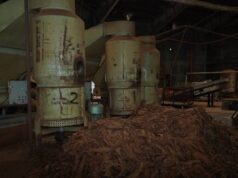ANGELES CITY – The provincial board of Zambales passed on Monday a resolution opposing the construction of a coal-fired thermal power plant within the Subic Bay freeport zone in Barangay Cawag in Subic, which was approved allegedly under questionable circumstances during the Arroyo administration.
Zambales Vice Gov. Ramon Lacbain said the resolution was unanimously approved by the board members amid earlier formal oppositions already filed by the city government of Olongapo and the Olongapo-Zambales Civil Society Organization (OZCSN) which are against the project “for health and environmental reasons.”
Alex Corpus Hermoso, lead convenor of OZCSN, said the project, now under construction, was initially junked by local officials of the Department of Environment and Natural Resources (DENR) who were overturned by then Environment and Natural Resources Sec. Lito Atienza.
Hermoso noted that the project “is opposed by major tourism-related locators such as the Ocean Adventure, Zoobic Safari, local resorts and hotels, as well as major civil society groups, non-government and people’s organizations.
The residents of Kalayaan and Binictican that is located within the Subic Bay Freeport Zone (SBFZ) and the general population of the sorrounding towns.”
Lacbain said the 300-megawatt project is also opposed by municipal government of Subic where the project is located in Sitio Naglatore in Barangay Cawag.
Lacbain said that scores of families have already been evacuated from the project site in Naglatore after they were given a compensation totalling about P3 million, without offering them alternative relocation site.
The families, he noted, have started to squat along the highway in Barangay Cawag.
Hermoso said that “aside from the objectionable proposal on the basis of the danger to environment, hazard and threat to the growing tourism industry.
We are also questioning the joint venture between Aboitiz Power Corporation and the Taiwan Cogeneration Corporation (TCC) otherwise known as the RP Energy, Inc. on the basis of governance and socio-economic issues.”
The Subic Bay Metropolitan Authority (SBMA) and TCC signed a memorandum of understanding (MOU) on the project way back in July 2006.
Both the Zambales provincial board and the OZCSN insisted the project was unacceptable to local environment and the health of local folk.
OZCSN cited mercury and selenium as well-known contaminants of coal burning for power generation and these are linked to neurological and developmental problems and birth defects.
Hermoso also noted that the MOU on the project specifically stated a lease rate of US$3.50 per square meter for the whole 50 year period payable in long term.
He said, however, that this MOU was shelved by a lease and development agreement (LDA) signed between the SBMA and the RP Energy Inc. on June 10, 2010.
Under the LDA, the power project ceased to be a joint venture and established a mere lessor-lessee pact.
He said the RP Energy Inc. given a rate of $3.50 or about p125 per square meter for 50 years in an area where Neocove Resorts recently offered to lease for P500 per square meter.
Lacbain noted that despite mounting objections to the project, RP Energy Inc. was given business permit by the SBMA Business and Investment Group on October 2 last year.
Last April 18, the SBMA Ecology Department gave the firm a clearance to construct.
But Hermoso noted that SBMA Ecology Department had failed to submit a complete environmental standard for coal power plants “notwithstanding the five years since the MOU was signed, and it is therefore in no position to approve and recommend the project.”
A resolution passed by the OZCSN against project noted that “one of the main concerns aside from pollution effects and the threat to health and tourism industry is the amount of water draw-out rate that according to expert opinion will reach 1,600 cubic meters of water a day.”
“If this is way above the natural recharge rate of the Redondo Peninsula, the damage to the sources of water is a serious environmental concern.
Other locators in the same area that include Hanjin Industries need water as well,” the resolution said.
This, even as Lacbain said that the DENR failed to comply with the Local Government Code on the project amid lack of consultation on its acceptance by local folk.




